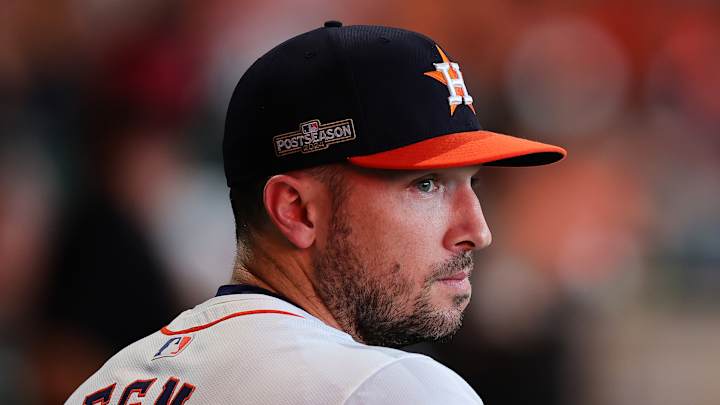Like a pot-belly! “Alex Bregman’s Bloated Contract Highlights Craig Breslow’s Misjudgment of Market Value and Red Sox’s Flawed Roster Strategy”…
Alex Bregman’s recent contract with the Boston Red Sox—a three-year, $120 million deal—has sent shockwaves through Major League Baseball.
While some fans see it as a necessary move for a struggling franchise, others believe it exposes Red Sox Chief Baseball Officer Craig Breslow as being completely out of touch with reality.
Between the financial commitment, the contract’s structure, and its potential impact on the team, Breslow’s decision raises serious questions about his long-term vision and strategic competence.
1. The Value: A Massive Overpay
At an average annual value (AAV) of $40 million, Bregman’s contract is among the most lucrative in baseball. While he is a two-time All-Star and former World Series champion, he is no longer the elite player he once was.
His 2023 season saw a respectable .262 batting average with 24 home runs and 98 RBIs, but those numbers do not justify a contract that places him among the highest-paid players in the sport.
For comparison, players like Freddie Freeman and Corey Seager, who have outperformed Bregman in recent years, are earning similar or even lower AAVs on longer-term deals.
Even the Detroit Tigers, who were reportedly interested in Bregman, only offered him a six-year, $171.5 million deal—suggesting that most front offices valued him at closer to $28 million per year.
By outbidding themselves to such an extreme degree, the Red Sox made an unnecessary financial gamble.
2. The Contract’s Structure: A Lose-Lose Deal for Boston
Not only is Bregman’s AAV absurdly high, but the contract also includes opt-out clauses after the first two seasons. This structure creates a worst-case scenario for Boston in multiple ways:
- If Bregman plays exceptionally well, he will simply opt out and demand an even larger contract, leaving the Red Sox without their marquee signing.
- If he underperforms or gets injured, the Red Sox will be stuck paying a declining player $40 million per year.
Breslow’s decision to grant these opt-outs suggests either desperation or a complete lack of leverage in negotiations. Either way, it is a reckless financial commitment that favors the player significantly more than the team.
3. The Positional Fit: A Puzzle That Doesn’t Make Sense
One of the most baffling aspects of this signing is that Bregman plays third base, a position already occupied by Rafael Devers, who signed a massive 11-year, $331 million extension last year.
That means the Red Sox are either planning to move Devers to designated hitter (which would limit roster flexibility) or shift Bregman to second base—a position he has barely played at the MLB level.
Defensive fit is a crucial aspect of any free-agent signing, and in this case, Breslow ignored it entirely. If Bregman struggles at second base, the Red Sox will have paid top dollar for a player who actively hurts their defense rather than improving it.
4. The Impact on the Red Sox’s Future
The Red Sox have been stuck in a cycle of mediocrity for years, and this signing does little to change that. The team’s biggest weaknesses remain in their pitching staff, yet Breslow chose to invest $120 million in an aging infielder rather than addressing those needs.
Additionally, by committing such a large percentage of the payroll to Bregman, the Red Sox will have less financial flexibility to sign younger, higher-upside players in the future.
This move resembles past signings (like the Trevor Story deal) that failed to move the needle for Boston but still tied up significant financial resources.
5. Market Impact: A Dangerous Precedent
Beyond just the Red Sox, this contract could have ramifications across MLB. By overpaying for a player past his prime, Breslow may have artificially inflated the market for aging infielders.
Future free agents in their 30s may now demand similar high-AAV, short-term deals, making it harder for teams to build sustainable rosters.
Moreover, the Red Sox’s front office already had a shaky reputation following Chaim Bloom’s tenure, and this signing does little to restore confidence.
If Breslow continues to make similarly short-sighted moves, Boston could be stuck in mediocrity for the foreseeable future.
Conclusion: A Move That Makes No Sense
Craig Breslow was hired to bring a modern, analytical approach to the Red Sox, but this contract suggests he may be in over his head.
Overpaying for an aging infielder, failing to address team needs, and structuring the deal in a way that benefits Bregman more than Boston all point to poor decision-making.
Rather than propelling the Red Sox back into contention, this move may ultimately become another cautionary tale of reckless spending in free agency.
Breslow had an opportunity to make a statement with his first major signing—but instead, he proved just how out of touch he is with the reality of modern baseball.
